Jasmine Birtles
Your money-making expert. Financial journalist, TV and radio personality.

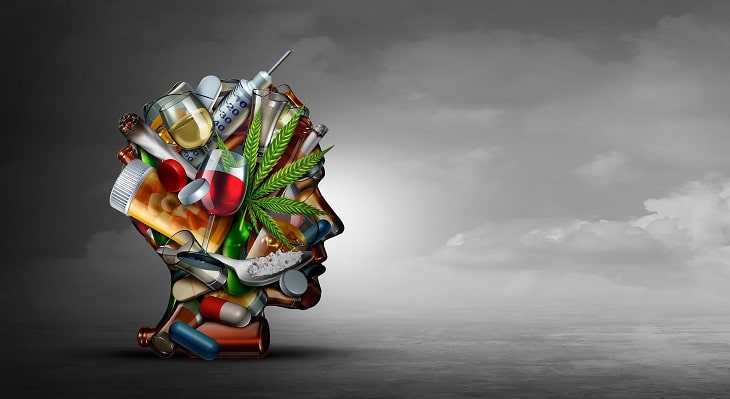
Updated 8th April 2024
Almost half of all adults aged 17 to 85 in the UK have either had an addition or been directly impacted by one, such as a spouse or sibling. That’s a whopping 22 million UK adults affected by addiction in some way. From alcohol to sex, shopping to food, addictive behaviour causes destruction to relationships, careers – and finances.
This is a comprehensive guide to help you recognise addictive behaviours in yourself or a loved one. We’ll show you how to address and overcome addictions, and make sure you’re not left in debt.
Addictions are scary. They take over your life – even if it’s not your addiction. Family relationships and friendships become strained, and the financial burden deepens the risk of harm to your mental health.
But DO NOT WORRY.
You’re not alone. Hundreds of thousands of people in the UK experience addiction every year – and that means there’s plenty of help out there for you.
This guide will help you understand the cost of addiction and how you can start to seek help.
Take a deep breath. It’s going to be OK.
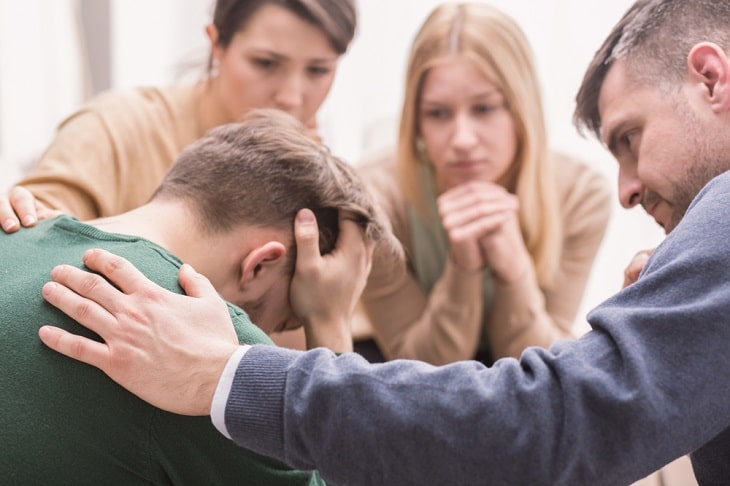
When we hear the word ‘addiction’, our minds often jump to illegal drug misuse or alcohol consumption. In reality, addictive behaviour is related to many different things, from gambling to food.
Drug misuse statistics show that almost 10% of adults have tried a drug in the last year. This doubles for the 16 – 24 age bracket to one million people (17.6%). Of course, the real statistics will be even higher, as these are just from those willing to report they have used drugs. The cost of addiction to the economy is staggering: the UK loses £15 billion to drug misuse every year (and a whopping £21 billion due to alcohol addiction).
However, addictive behaviour isn’t solely linked to using illegal drugs or consuming excessive amounts of alcohol. Gambling, for example, cost the public purse £412.9 million in 2023. Often, someone with one addiction is likely to have a related addiction, too.
For example, men who gamble are more likely to smoke and/or drink excessive alcohol. So, the cost of one addiction can’t really be analysed on its own. The whole picture makes it look bleak: very often, someone trying to kick one addiction moves onto another to replace it.
How many smokers do you know, for example, who have switched to vaping instead? The root cause of addictions is usually in the behavioural patterns – not the thing you’re addicted to. So, without getting professional help for an addiction, you (or your loved one) risks replacing one costly addiction with another.
While each type of addiction has their unique quirks (which we’ll look at later), there are some common signs you’ll notice in yourself or your loved one that signals addictive behaviour.
If you notice any of these signs, don’t panic. It’s important to remember that addictions – and addictive behaviour – can be treated.
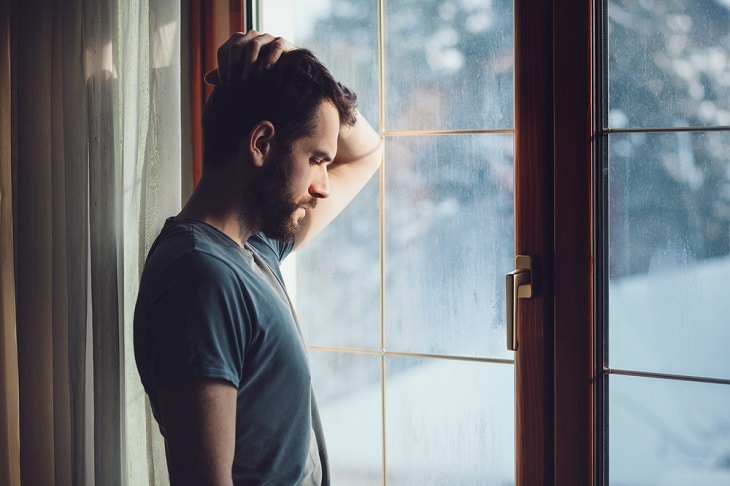
The impact of addiction isn’t just taking more risks or becoming obsessed by your addiction. It has bigger effects, too.
Relationships start to suffer as the addictive activity is prioritised over social interaction. You might cancel plans all the time, or start avoiding people altogether. This social isolation can drive your addiction in a vicious cycle: without the support of family and friends, the small positive reinforcements you get from your addiction are what keep you happy.
For example, those with a shopping addiction may not leave their home for days on end. However, with access to the internet, it’s easy to have the thrill of ordering shopping online. This thrill – which feels like validation of yourself or your actions – is what makes the addiction powerful. You want it again, so you’ll buy more things.
Addiction is related to dopamine, the ‘feel good’ hormone. When we get a little rush from something exciting, that’s dopamine kicking in. But, over time, we need to do more drastic things to get the same hit. This is where the cycle of addiction is insidious: it builds slowly over time, changing your habits until it runs your life. You might find yourself prioritising your addiction over family, friends, and social events – and at first it’s easy to say you can’t afford to go out (so you can spend your spare cash on your addiction), but then you actually can’t afford to go out. Addictions also get in the way of work as well as worsen your mental health.
Addictive behaviour goes hand-in-hand with other mental health problems such as depression and anxiety. There is also some evidence to suggest that addiction is more common in neurodivergent people such as those with ADHD, because of the dopamine cycle it offers as a coping mechanism for being neurodivergent in a neurotypical world.
It’s important to understand that poor mental health often works in a vicious cycle: sometimes, someone is depressed so they become addicted to something that gives them a temporary sense of positivity. When that feeling goes away again, they turn to their addiction once more to feel better.
Other times, addictive behaviour has a negative impact on a person’s life which causes depression. They then continue their addiction to feel that thrill or to fill the empty feeling that so often comes with depression.
The cycle is very hard to break and can lead to devastating consequences. For example, there are around 400 suicides each year by problem gamblers (those gambling outside of their means and in an addictive cycle) in England. This is, of course, reductive as studies don’t usually take into account the combination of mental health issues and co-addictions such as self-medicating with alcohol to avoid depression caused by gambling debt. It is, still, a sobering figure.
If your addiction is severely affecting your mental health, seek help and advice immediately.
You can call:
If feelings of self-harm are immediate and urgent, go to your local Accident and Emergency department straight away.
Addictions affect more than one person: it takes a toll on those around them, too.
Loving someone with an addiction, whether they’re your spouse, sibling, parent, or friend, is hard. You want to take responsibility to help them overcome their addiction. It also creates a lot of friction in your relationship, too: anger and resentment can build up as the addiction starts to take priority over people.
Getting help for an addiction is very much up to the person with the addictive behaviour. However, there are things you can do to support them on their way to getting help:
Sometimes, all the person with the addiction wants you to do is to listen to them. Talk to them about their addiction, how they feel about it, and why they think they do it. Ask what they want to do about it, too: they may want to seek help but not know how to ask.
Addictions aren’t easy to get over: it’s a long road and it’s exhausting. If you feel you can’t help your loved one any more than you already have, remember that it’s completely OK to tell them this.
Put some distance in your relationship if you need to take time away to regroup: you’ve got to look after yourself first. It feels selfish, but you’re no use to anyone if you’re burned out, too!
Almost anything can be an addiction. It’s the behaviour pattern of crave, fix, heightened pleasure, crash, crave that makes it an addiction. Here are the most common ones seen by GPs and addiction centres in the UK – and how to get help for them.
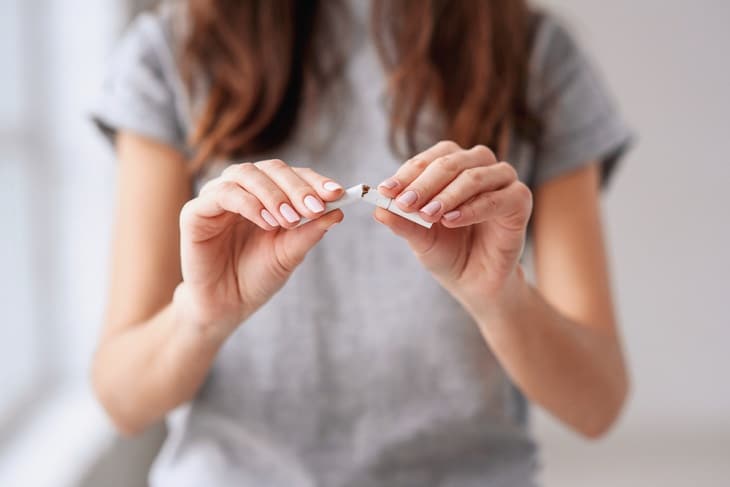
In 2006, 22% of adults in the UK smoked. The smoking ban came into effect in 2007 – and had a massive impact on the number of smokers. In 2023, just over 12.9% of adults smoked, down from 14% in 2018. The new smoking age rules may mean this figure drops radically in the future.
We don’t often think of smoking as an addiction. We know it’s harmful to our health, but taking smoking breaks from work, lighting up on a night out, or having a coffee and cigarette for breakfast are still socially acceptable.
However, the habit doesn’t just affect your health. It’s directly linked to reduced finances, too!
The average smoker gets through ten cigarettes a day, or half a pack (the minimum pack size is 20). At the time of writing in April 2024, a pack cost an average of £15.45. That’s a cost of around £7.75 per day, depending on the brand. For a daily habit, that adds up to 3.5 packs a week – a cost of £54.25. Over the course of a year, that’s £2,821.
The NHS offers lots of help for people who want to quit smoking. Specialist nurses can help support you through your quitting journey. They may also help you access certain prescriptions to help you stop smoking, too.
Find out how to contact your local stop smoking NHS service here.
If you’re struggling with how to quit smoking, you can also try to wean yourself off cigarettes with nicotine patches or gum. However, the support you’ll get from your local stop smoking service is likely to be the boost you need to stick to your dedication to quit.

Another socially acceptable drug, excessive alcohol consumption is a huge problem for health and social services in the UK. One in five hospital inpatients admits to harmful alcohol consumption, and one in ten rely on it every day.
It’s so easy to abuse alcohol: we live in a culture where going to the pub is a standard social event. We’ll go for a drink after a hard day’s work, drag friends on a pub crawl to celebrate birthdays, and give alcoholic gift sets at Christmas.
We joke about needing a stiff drink for courage or to cope with a stressful day. Even fashion items have made drinks like gin and Prosecco fashionable to a new generation, with mugs adorned with slogans like “There’s too much tea in my gin”. The casual approach to alcohol means it’s easy to not realise an addiction is forming.
You might not think you’ve got an alcohol problem if you still go to work every day and don’t binge drink. We imagine alcoholics to be unable to work due to being drunk all the time, or someone who has to drink a litre of vodka every day to stop the shakes.
In fact, you may have an alcohol addiction and not realise it.
Overcoming an alcohol addiction is particularly hard because it’s such a huge part of our culture in the UK. Becoming tee-total is a challenge in itself, made all the harder when we’re expected to go to social gatherings where alcohol is served.
However, it’s important to address your drinking sooner rather than later. It doesn’t just cause irreversible health problems: the financial strain of drinking is phenomenal.
Take your first steps to recovery and:
It is getting easier for sober people to participate in social events, too. You might have noticed a recent boom in non-alcoholic drinks, ranging from whisky to Prosecco, to alcohol-free gin and rum. Pubs and restaurants are getting in on the new profit-maker, with many more non-alcoholic options available on menus, and gift sets now easy to get hold of for Christmas. Going to the pub might not be right for your recovery journey, but if you do there’s no longer any need to stick to a boring Pepsi (or Coke).
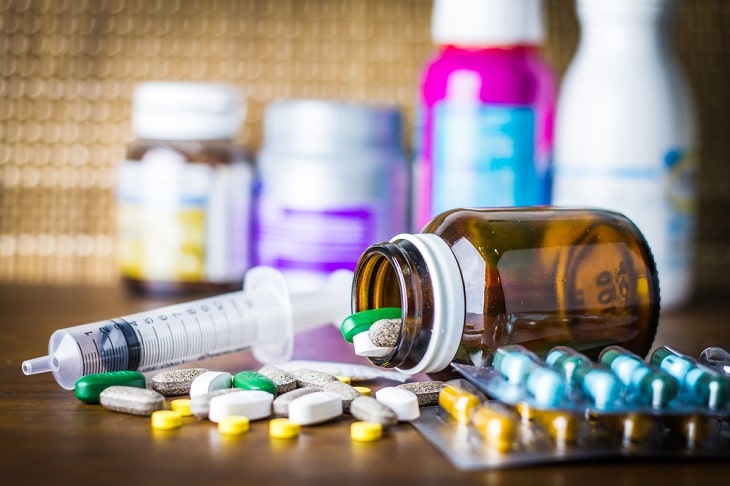
Illegal drugs are what most people think of when we say the word ‘addiction’.
However, more people are addicted to prescription drugs than ever before. It’s easily done: you have an injury and the doctor prescribes very strong painkillers. These drugs are addictive – so when you’re fully healed, you still want the fix of the drug. Recent TV series such as Dopesick have highlighted the scale and damage of the prescription opioid crisis – confirming that, if you find yourself relying on your painkillers in a way that disrupts your behaviour, you’re not alone.
Whether you’re addicted to illegal narcotics, marijuana, or prescription drugs, the impact is the same. Your behaviour changes as you prioritise the substance over your relationships, career, family, and even self-care.
Drugs, like alcohol, also affect your brain chemistry. You’re more likely to suffer related mental health problems – and this is why drug-related suicides are so desperately high every year, too.
The financial implications of drug addiction is clear. Many with substance misuse problems end up neglecting other finances in their lives, such as rent or mortgage payments, to buy their drug of choice. What might start as a small £20-a-week habit for a weekend party hit can easily spiral into thousands of pounds over the course of the year.
Always seek help from your GP first. If you don’t want to see your family doctor, or don’t have one, there are other services with registered doctors who can help. It’s vital that you don’t try to attempt ‘cold turkey’ quitting: you’ll need medical supervision.
You can also contact:
For help accessing drug recovery services.
Drug and alcohol charity, AdFam, has a fantastic list of resources for you – and your loved ones affected by your addition – too. Click here for a list of organisations.

We don’t talk about sex addiction much in the UK – but it’s a growing problem. It’s not only about those who feel the need for intimacy with a lot of people, as addictions to pornography affect a huge number of the population, too. In fact, two-thirds of young people are addicted to online pornography, according to a 2023 study.
Financially, a sex addiction may seem mild – but it quickly adds up. You may choose to pay for sex – or even go on a costly ‘sex tourism’ holiday to countries in which it’s legal. Other people find their addiction to porn means they’re paying for premium website content – or spending a lot of money on webcam shows. The rise of OnlyFans as a way to access porn on the go has led to some high-profile cases of people spending thousands of pounds (or dollars), as the simplicity of a transaction makes it easy to send money for ‘customised’ pornography.
Sex addictions are most commonly rooted in a behavioural need for validation or gratification. This means the best approach to overcome your addiction is to seek behavioural therapies, such as cognitive behavioural therapy, to re-train your brain. Unlike quitting a substance you’re physically addicted to, sex addiction requires a deep look at the cause of your behaviour.
Try contacting these organisations for support:
If online porn is your main problem, you can try setting up website blocks for your most frequently visited websites or set a child lock on your Internet Service Provider (which helps limit what adult material can be viewed by anyone on your broadband network).

Gambling addictions have rocketed since online gambling became easy for any adult to access. While online casinos have financial limits, there’s nothing stopping you from holding accounts with several websites at a time.
This makes it easy to lose thousands of pounds in one day. The trouble with gambling, unlike other addiction types, is that you don’t always get the fix you need. The big win is what keeps you going – but in chasing that feeling of winning, you can easily lose a lot of money.
While it is now harder to rack up a gambling debt on lots of credit cards (as only debit cards can be used in the UK), this doesn’t stop people from taking loans or depleting other financial resources to fund their gambling addiction.
Unlike other addictions, you don’t have to need the substance or habit every single day. Problem gambling occurs when:
The good news is that there are many places to get help.
Try these resources to start with:
You can also speak to friends and family and, if you feel it necessary, ask someone you trust to help by managing your money for you. This way, you won’t be able to spend money without explaining what it’s for – and can really help highlight to yourself how large a problem your gambling has become.

A shopping addiction might seem harmless – but imagine what it’s doing to your finances.
Onoimania – the real name for it – is a strange addiction as it comes in two parts: the thrill of browsing or online shopping, and then the thrill of finding and buying something. If you’re shopping online, there’s the third peak of joy when the parcel is delivered.
Shopping addicts often try to justify their purchases by sounding thrifty. “It was 70% off”, “I got it on a two-for-one offer”, that kind of thing. However, unless you need the thing you were buying, 70% off is still 30% more than you’d planned to spend in the first place!
The financial impact of a shopping addiction is clear. People carry on spending even when they don’t have the cash for it. Store cards are a huge problem here, too: the ‘buy now, pay later’ easy credit makes it really straightforward to access ‘free’ purchases.
They’re not free: a store card has a huge rate of interest, too! So, instead of paying £10 for an item, you could end up paying back £15 for it. It’s easy to see how debts from shopping addictions rack up without you realising.
Shopping addictions are less health-related than some other addictions, in that it won’t cause illness. However, it’s still rooted in a mental health disorder – so make sure you speak to your GP as the first port of call. They’ll be able to refer you for behavioural therapy to help you address the root cause of a shopping addiction.
You can also:
People with addictions also start to lose focus on other things in their lives – such as their job. They make take more sick days or simply stop going to work altogether. This, in turn, worsens the financial impact of addictions.
Addictions need money, too. Whether you’re gambling, paying for sex, or have a binge relationship with food, it all needs funding. This makes it very easy to fall into debt.
The impact of addictions on mental health is significant for financial reasons, too. Many people with depression and anxiety struggle to face tasks such as opening letters or paying bills. As the debts of unpaid bills mount up, the stress increases.
Not only does it mean debts build as bills go unpaid (either intentionally or forgotten about) – but it also means the addiction takes centre stage. Stress builds, they turn to their addiction, spend money on it to feel better – and increase their debts.
If you’re struggling to keep on top of your bills or feel anxious about opening letters and managing your admin, don’t panic.
First, speak to your local GP for advice and help. They may refer you to a specialist or be able to recommend local services in your community who can help.
Next, ask a close friend or family member to help with your admin. It’s really hard to ask, but sharing the burden with them will immediately take some of the stress off. They can help you to assess what you owe and who needs to be paid.
Finally, and this is a tough one, get in touch with your credit card company, bank, and utilities providers. If you’re too anxious, ask your friend to call them on your behalf (but you’ll need to be present to authorise this on the phone).
Ask your bank and credit card company to freeze any payments for a short period of time. If they can’t or won’t do that, negotiate a reduced amount or at least freeze interest charges. This will give you some breathing space to sort out your finances.
You can call a specialist agency for help with your finances, too.
Try:
These are all completely free services to help you overcome and manage your debts.
You can also check out our guides on debt management to help get you started.

The biggest thing to remember when coping with an addiction is that you’re bigger than it will ever be.
You’ve lived well long before your addiction took hold: you don’t NEED it to live. You can get back to that feeling of independence (instead of dependence).
It’s not going to be easy – especially when you’re recovering your finances, relationships, and wellbeing all at the same time. There are so many places to go and people who want to support you, the only thing you need to do is ask for help.
It’s worth it. You’re worth it. You’ve got this.
When you’re ready, check out our other sections about benefits and debt management, and how to make money, to start your financial recovery, too.

Good advice in this article.
Thanks Joanne, I’m glad you found this article interesting and helpful!